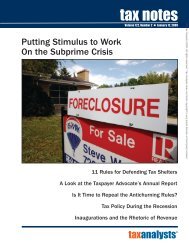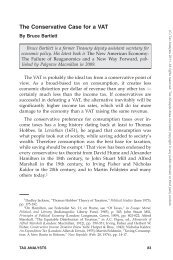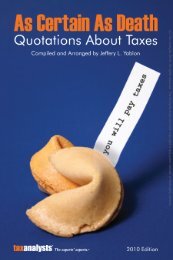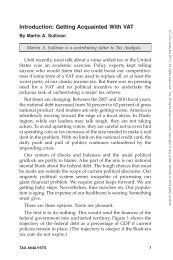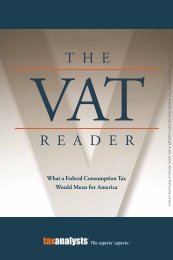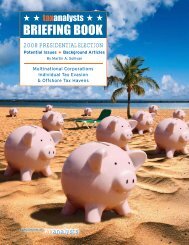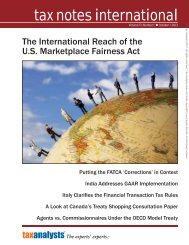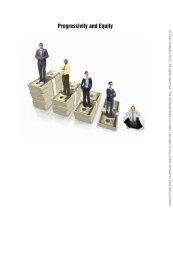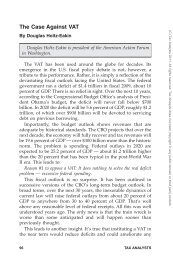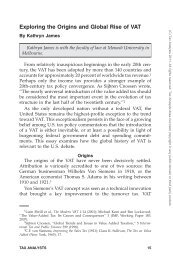Forty Years of Change, One Constant: Tax Analysts
Forty Years of Change, One Constant: Tax Analysts
Forty Years of Change, One Constant: Tax Analysts
You also want an ePaper? Increase the reach of your titles
YUMPU automatically turns print PDFs into web optimized ePapers that Google loves.
<strong>Forty</strong> <strong>Years</strong> <strong>of</strong> <strong>Change</strong>, <strong>One</strong> <strong>Constant</strong>: <strong>Tax</strong> <strong>Analysts</strong><br />
Although any <strong>of</strong> those could make a fine<br />
candidate as the most significant development <strong>of</strong><br />
the past 40 years, I would instead point to a fundamental<br />
tax policy that has not changed but may be<br />
seen to have been substantially abandoned.<br />
We see the U.S. stubbornly clinging — nominally<br />
— to the spent policy <strong>of</strong> imposing worldwide as<br />
opposed to territorial taxation on foreign subsidiaries,<br />
while all around it others (most recently Japan<br />
and the United Kingdom) are abandoning it. We<br />
say “nominally” because doesn’t the enactment<br />
<strong>of</strong> code section 965 show both the futility <strong>of</strong> the<br />
policy and the effective abandonment <strong>of</strong> it? U.S.<br />
companies do not put their fiscal heads into the<br />
grasping jaw <strong>of</strong> the Treasury. They do not have<br />
their foreign subsidiaries pay dividends that would<br />
produce U.S. tax. Instead they either simply have<br />
their foreign subsidiaries reinvest their pr<strong>of</strong>its<br />
outside the U.S. or achieve strategies to repatriate<br />
without paying material U.S. tax.<br />
This dynamic, and the undesirable effect it has<br />
<strong>of</strong> depriving the U.S. economy <strong>of</strong> the benefits <strong>of</strong><br />
repatriated foreign pr<strong>of</strong>its, led directly to the enactment<br />
a few years back <strong>of</strong> section 965 and its special<br />
incentive rate (5.25 percent) on repatriated foreign<br />
pr<strong>of</strong>its. According to a March 4, 2010, government<br />
report, 1 843 U.S. multinationals repatriated funds<br />
totaling $312 billion previously kept abroad. The<br />
report indicates that, with another $958 billion<br />
<strong>of</strong> undistributed controlled foreign corporation<br />
pr<strong>of</strong>its built up since 2005, multinationals are<br />
expecting a repeat.<br />
In Canada the benefits <strong>of</strong> territoriality are being<br />
creatively — some would say radically — bartered<br />
by the government with tax havens for taxpayer<br />
information under a combination <strong>of</strong> tax information<br />
exchange agreements and domestic law. Before<br />
1976 Canada had a full territorial system (or as<br />
Europeans call it, a participation exemption); since<br />
then territoriality has been linked to the mere existence<br />
<strong>of</strong> an income tax treaty or TIEA.<br />
Viewed together, the Canadian and U.S. sides <strong>of</strong><br />
the territorial-vs.-worldwide debate tell a compelling<br />
story — one that for me is as significant as any<br />
since <strong>Tax</strong> <strong>Analysts</strong> was established 40 years ago or<br />
I started pr<strong>of</strong>essional practice 48 years ago.<br />
1. See Congressional Research Service, “<strong>Tax</strong> Cuts on Repatriation<br />
Earnings as Economic Stimulus: An Economic Analysis,”<br />
by Donald J. Marples and Jane G. Gravelle, Mar. 4, 2010,<br />
7-5700, R40178 (prepared for members and committees <strong>of</strong><br />
Congress). Available at www.crs.gov. See also the IRS Spring<br />
2008 Statistics <strong>of</strong> Income Bulletin.<br />
Michael Boskin<br />
Hoover Institution, Stanford University<br />
Palo Alto, Calif.<br />
Economists, myself included, have long<br />
proposed broader tax bases and lower marginal<br />
tax rates, ideally on consumed income. Thus the<br />
substantial reduction in marginal income tax rates<br />
compared with 1980 and indexing the tax brackets get<br />
the gold medal for tax policy in the last few decades.<br />
The silver medal goes to the implementation <strong>of</strong><br />
tax-deferred saving — such as 401(k)s and IRAs<br />
— moving us closer to a consumption tax base,<br />
however imperfectly. The bronze medal goes to<br />
lower dividend and capital gains taxes, reducing<br />
the double taxation <strong>of</strong> corporate income, again<br />
quite imperfectly.<br />
Turning to the dunce caps, the bronze goes<br />
to the failure to substantially broaden the tax<br />
base. The code is not only more complex, but the<br />
proliferation <strong>of</strong> deductions and credits, some now<br />
refundable, seriously erodes the base. The silver<br />
for worst policy in recent decades is the high U.S.<br />
corporate tax rate — the second highest among<br />
advanced economies (although somewhat less out<br />
<strong>of</strong> line in the effective rate). Finally, the gold goes<br />
to the failure to control spending and successfully<br />
tie together tax and spending policy. The government’s<br />
budget constraint requires the present<br />
discounted value <strong>of</strong> future taxes to cover the present<br />
value <strong>of</strong> future spending plus the national debt<br />
(net <strong>of</strong> government assets). Thus, large deficits and<br />
exploding national debt imply higher future taxes<br />
unless spending is controlled. This constitutes the<br />
biggest failure <strong>of</strong> tax policy.<br />
Special (dis)honorable mention goes to the immense<br />
instability <strong>of</strong> the tax code, as frequent changes<br />
and temporary provisions create unnecessary tax<br />
planning and economic chaos.<br />
Herman Bouma<br />
Buchanan Ingersoll & Rooney PC<br />
Washington<br />
From my perspective as an international tax<br />
attorney, the most significant policy development I<br />
have seen in the last 40 years is the serious consideration<br />
by more and more members <strong>of</strong> the U.S.<br />
Congress <strong>of</strong> a move to a territorial system.<br />
7




